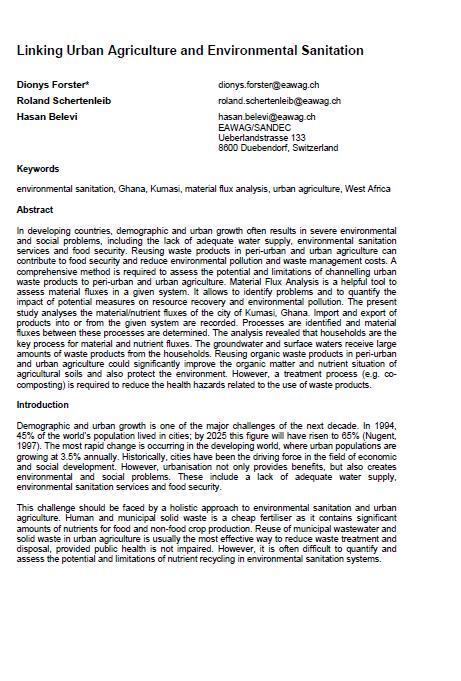Linking Urban Agriculture and Environmental Sanitation
Forster, D., Schertenleib, R., Belevi, H. (2003)

Published in: 2003
Author:
Forster, D., Schertenleib, R., Belevi, H.
Uploaded by:
SuSanA secretariat
Partner profile:
common upload
5459 Views
110 Downloads
Location of library entry
Content - Summary
In developing countries, demographic and urban growth often results in severe environmental and social problems, including the lack of adequate water supply, environmental sanitation services and food security. Reusing waste products in peri-urban and urban agriculture can contribute to food security and reduce environmental pollution and waste management costs. A comprehensive method is required to assess the potential and limitations of channelling urban waste products to peri-urban and urban agriculture. Material Flux Analysis is a helpful tool to assess material fluxes in a given system. It allows to identify problems and to quantify the impact of potential measures on resource recovery and environmental pollution. The present study analyses the material/nutrient fluxes of the city of Kumasi, Ghana. Import and export of products into or from the given system are recorded. Processes are identified and material fluxes between these processes are determined. The analysis revealed that households are the key process for material and nutrient fluxes. The groundwater and surface waters receive large amounts of waste products from the households. Reusing organic waste products in peri-urban
and urban agriculture could significantly improve the organic matter and nutrient situation of agricultural soils and also protect the environment. However, a treatment process (e.g. cocomposting) is required to reduce the health hazards related to the use of waste products.
Bibliographic information
Forster, D., Schertenleib, R., Belevi, H. (2003). Linking Urban Agriculture and Environmental Sanitation.
Filter tags
English Sub-Saharan Africa Urban (entire city)















